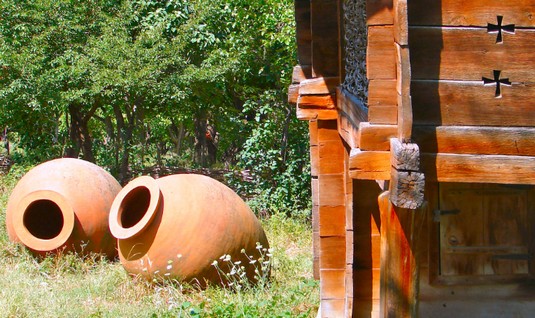
by Simon Appleby
Today is the Feast of Transfiguration; while it falls during the Dormition fast, dietary restrictions are relaxed today.
Prior to the conversion of Georgia to Christianity in the 4th century, various folk religions and Greek-influenced pagan cults were present in the country. As Georgia has the world’s oldest winemaking tradition (over 8000 years), viticulture plays a very large role in the lives of lowland Georgians, and the management practices of the vineyard were often linked with religious festivals. Archaelogical ruins in Georgia indicate that Dionysian/Bacchan cults were widespread before Georgia’s conversion, and that rites to this god involving wine and grapes were common.
Orthodox Christian practice, past and present, has been to examine local pagan customs and, provided such customs are not wicked, to adapt and Christianise them. For example, Orthodox priests in China commonly hold a liturgy in memory of the deceased for Chinese converts on the two Grave-Sweeping Festivals, which are ancient ancestor-worship festivals. The Church Fathers in the early days of the Church in the Roman Empire likewise evaluated local folk customs and pre-existing Jewish rites, and conflated them with Church festivals. The presentation of grapes at Transfiguration is one of these customs.
Presenting fruit and grapes at the temple is an ancient Jewish custom (Gen 4:2-4; Ex 13:12-13; Num 15:19-21; Deut 8:10-14). It was Christianised by the Apostles (1 Cor 16:1-2). Presentation of grapes at the temple is mentioned in the Third Rule of the Apostolic Canon, which is the earliest collection of written ecclesiastic laws (canons) in our possession, dating to the second century.
In the first centuries of the Church, the faithful presented to the temple the fruit and produce of each seaon’s new harvest: bread, wine, oil, incense, wax, honey and fruit . Bread, wine, oil and wax were taken to the altar, while the other offerings were used to feed the clergy and the poor who were under the Church’s care.
In Georgia, the date of the grape harvest or Rtveli is determined by the ripeness of the grapes rather than a fixed date, but traditionally it was forbidden to consume grapes during the Dormition fast before Transfiguration and so Rtveli always occurs no earlier than Transfiguration. In practical terms, Rtveli is usually no earlier than the last week of August, and in the mountainous areas of western Georgia it can be as late as November.
There is a theological significance to the blessing of grapes at Transfiguration. Just as we celebrate Christ’s Transfiguration today, we celebrate this with objects that undergo both physical and spiritual transformation. Grapes are physically transformed, from flower to fruit, from fruit to must, and from must to wine. Grapes are also spiritually transformed, from ordinary wine into the Blood of Christ during the Divine Liturgy.
It should also be recalled that the Church is frequently described as a vine, with the faithful being the fruit that it bears.
In addition, King Demetre 1st of Georgia in the 12th century wrote a hymn of praise to the Ghvtismshobeli, the Virgin Mary, describing her as a beautiful vineyard. As Georgia is the land allocated to the Virgin Mary by the Holy Spirit, the hymn functions almost as an unofficial national anthem and is very popular. The melody by the 19th century composer Paliashvili is favoured today. The lyrics of the hymn “Shen Khar Venakhi/Thou Art a Vineyard” are:
Georgian text:
შენ ხარ ვენახი, ახლად აყვავებული,
ნორჩი კეთილი, ედემს შინა ნერგული,
(ალვა სუნელი, სამოთხეს ამოსული,)
(ღმერთმან შეგამკო ვერვინა გჯობს ქებული,)
და თავით თვისით მზე ხარ და გაბრწყინვებული.
Latin transliteration:
shen khar venakhi, akhlad aqvavebuli.
norchi k’etili, edems shina nerguli.
(alva suneli, samotkhes amosuli.)
(ghmertman shegamk’o vervina gjobs kebuli.)
da tavit tvisit mze khar da gabrts’qinvebuli.
English translation:
You are a vineyard newly blossomed.
Young, beautiful, growing in Eden,
(A fragrant poplar sapling in Paradise.)
(May God adorn you. No one is more worthy of praise.)
You yourself are the sun, shining brilliantly.
© georgianorthodoxchurch.wordpress.com






